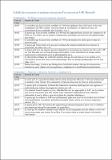Rethinking Early Years Assessment Student and Teacher Perceptions in Balancing Institutional Demands and Developmental Needs in 3–4H HarmoS

Type de référence
Date
2025-07-02Langue de la référence
AnglaisEntité(s) de recherche
Résumé
The assessment of learning in 3-4 HarmoS is generating debates about its impact on pupils' development and its ability to adequately reflect their capabilities. Current assessment practices, often inspired by higher grade levels, have difficulty taking into account the developmental specificities of young children (Clerc-Georgy & Truffer Moreau, 2016) and are deeply inscribed in representations of what the assessment of learning should be. This poster presentation aims to validate a scale designed to explore the perceptions of pre-service HEP students and novice teachers about assessment practices in the early years of compulsory schooling. The aim is to understand how these perceptions are formed and how they may influence their future assessment practices. The literature reveals tensions between different conceptions of assessment in the early years. The psychometric tradition, which still dominates, sees assessment as a normative tool designed to measure isolated skills in a standardised context (Resnick & Resnick, 1992). This approach, based on achievement testing, tends to overlook the social and contextual dynamics of learning and the developmental potential of pupils (Bredo, 1999). In contrast, a dynamic perspective emphasises formative assessment and focuses on identifying pupils' strengths and potential in authentic and interactive learning contexts (Fleer & Quiñones, 2013). This approach values the observation of learning processes in natural situations and interactions between pupils, peers and teachers (Bagnato, 2007) In parallel, Yerly (2014) demonstrates that assessments, while useful for harmonizing practices and meeting institutional demands, are often perceived by teachers as an "unavoidable necessity." Teachers report experiencing significant pressure, sometimes feeling as though their own performance is being evaluated more than their pupils'. This observation resonates strongly within the 3-4 HarmoS context, where teachers must navigate between institutional expectations and practices tailored to the developmental needs of young children. Research also shows that assessment practices in the early years are influenced by institutional agendas, curriculum standards and societal expectations that place pressures on teachers (Elwood & Murphy, 2015). These pressures encourage the use of standardised tests or administrative tools that are often not appropriate to the realities of young children's learning. However, teachers in the early years express a growing need for more holistic approaches that integrate the social, emotional and cognitive dimensions of students' development (DeLuca & Hughes, 2014). In this context, the perceptions of pre-service and novice teachers play a key role in shaping assessment practices. These perceptions are influenced by their initial training, classroom experiences and beliefs about children's learning and development (Tardif, 1993). However, few studies have examined how these perceptions are formed and develop over time, or how they influence assessment practices. The scale we will present aims to explore these perceptions by analysing data from pre-service students (N=50) and novice teachers (N=10). It consists of 24 items and distinguishes between more traditional approaches (e.g. assessing reading by decoding simple sentences individually) and more dynamic ones (e.g. assessing children's overall development across affective, social, motor and cognitive dimensions). These findings are complemented by additional data on pedagogical practices identified as necessary, contrasting behaviourist orientations (e.g. knowledge acquisition through repetition and memorisation) with constructivist approaches (e.g. learning through exploration and experimentation). These analyses highlight tensions between institutional requirements and professional aspirations, while identifying ways to better adapt assessment practices to the needs of pupils in 3-4 HarmoS.Evaluation par les pairs (peer reviewing)
ouiNom de la manifestation
SSREDate(s) de la manifestation
2-4 juillet 2025Ville de la manifestation
LucernePays de la manifestation
SuisseURL permanente ORFEE
http://hdl.handle.net/20.500.12162/8458Document(s) associé(s) à la référence
Texte intégral :
Fichier
Accès
Commentaire
Taille
Ouvert
Échelle des croyances et pratiques en matière d’évaluation en 3-4P (HarmoS)
104.1ko
Autre(s) document(s) :
Fichier
Accès
Commentaire
Taille
Ouvert
Échelle des approches pédagogiques au cycle 1
91.62ko
- Tout ORFEE
- Détail référence



